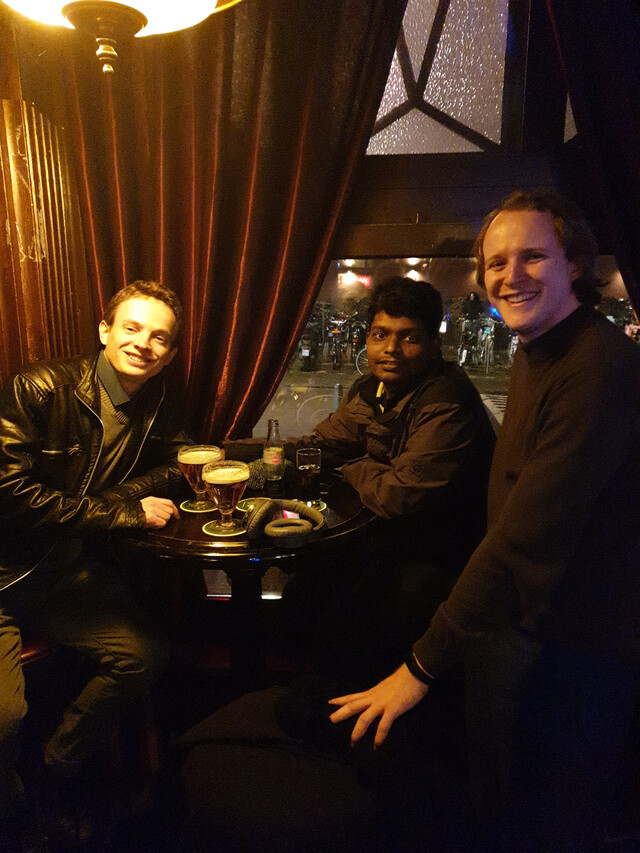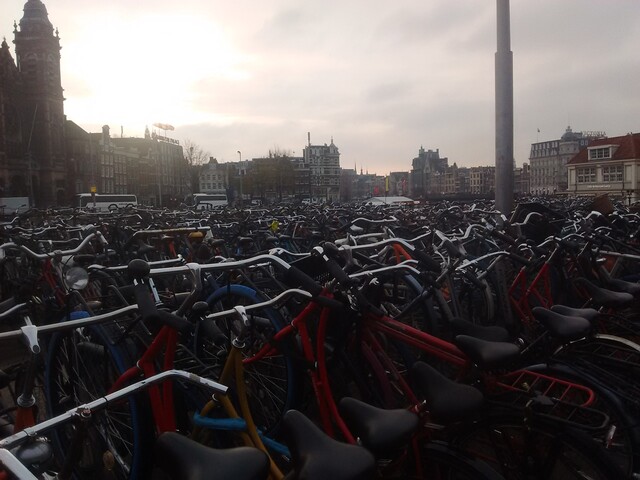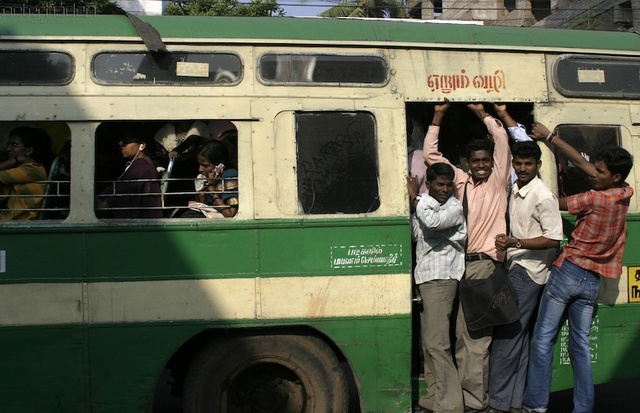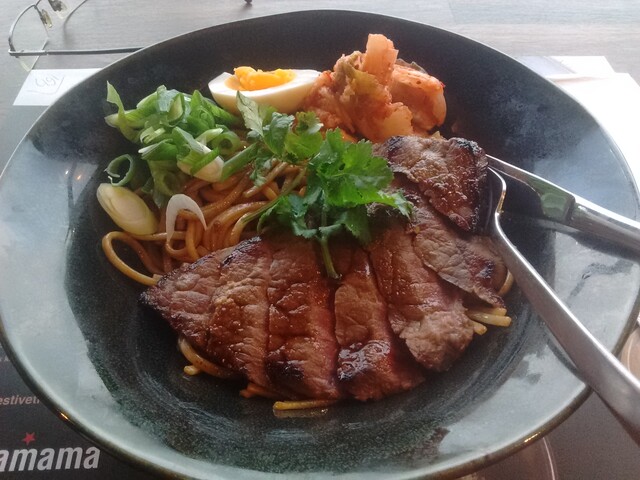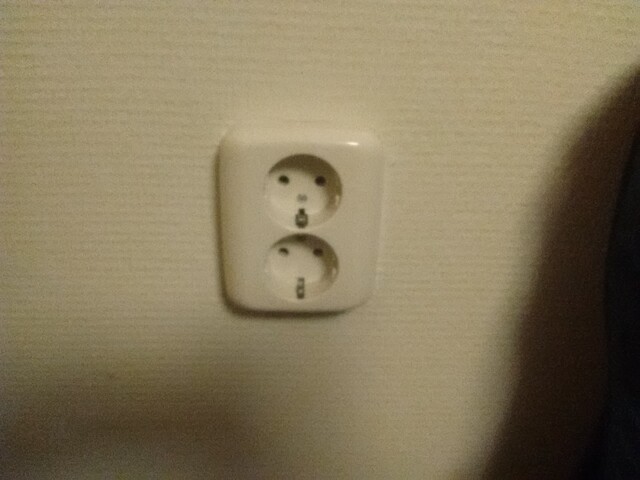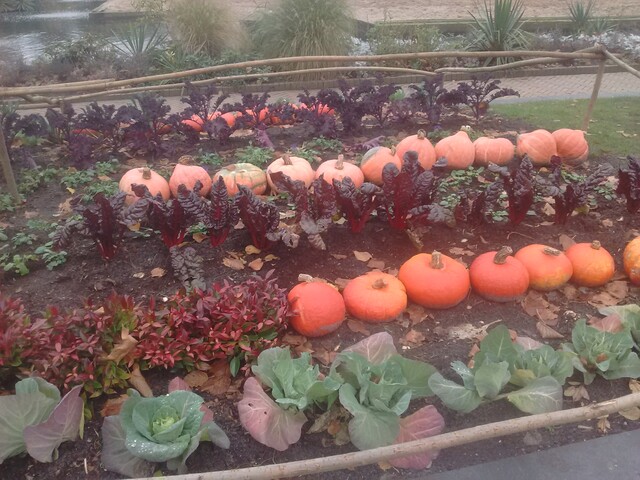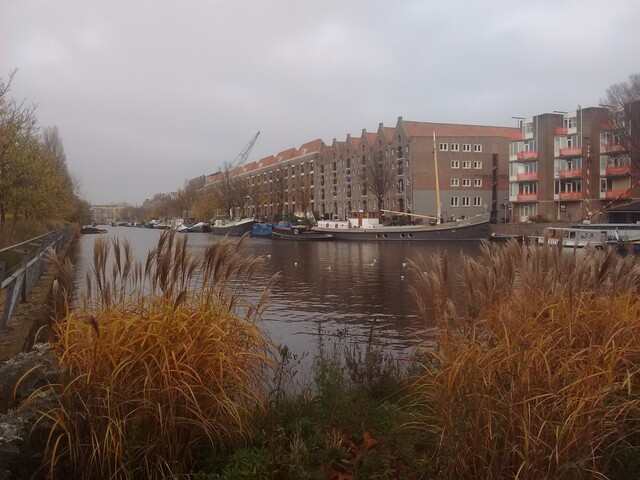Netherlands trip
Published by Arun Isaac on
In other languages: தமிழ்
Tags: travel, amsterdam, europe
Last November, I was in Amsterdam for the NL-RSE 2019 conference. This was my first time travelling to Europe. I got to meet Pierre Neidhardt and Jelle Licht – two fellow free software contributors I know from the GNU Guix project. We have interacted through the project mailing list. But, so far, I only knew them as names that appeared in my mail client. Finally, I got to know the people and faces behind the names. It was like finally meeting long time pen pals in person.
Public Transport
Amsterdam is known as the bicycling capital of the world. Most people commute by bicycle and public transport. There are so few cars. This is not simply due to individual enlightenment, but largely due to city planning that heavily favors people over cars. Most of the space on the road is pedestrian walkway. Then, there is space for tram lines.1 And, only if there is any space left, is there a lane for cars. Every public transport stop, be it a large metro station or a small tram stop, has a map of the entire public transport network and an electronic screen showing the next train or tram that will arrive and the time at which it will arrive. If the screen says a tram will arrive in 2 minutes, it will indeed arrive in 2 minutes! In India, information screens seldom work and even if they do work you trust them at your own peril. It is always better to ask bystanders for accurate local information. So, in the beginning, I looked at the information screens with a healthy dose of skepticism. But, much to my surprise, they were exactly correct all the time! These real-time screens might seem like an unnecessary luxury. But, not having to guess and hope at when the next tram or train is going to arrive, takes the uncertainty, doubt and stress out of public transport.
In India, we have seats reserved for women on public transport. Even though this is only seating priority, in practice, it works more like seating segregation. There is an unspoken rule that you do not sit next to a member of the opposite gender. The Netherlands had none of that. Due to my long conditioning, in the beginning, I did feel awkward about sitting next to a woman. But soon the feeling vanished and I even stopped noticing the gender of passers-by. Seeing people as people without characterizing them by their gender was a refreshing new experience.
In India, buses are so crowded with barely place to stand. And, given the terrible traffic, there is so much uncertainty about when you will reach your destination. So, when someone gets up to leave, we have a tendency to shamelessly grab their seat before someone else does. But, in Amsterdam, since public transport commute times are so deterministic, people hardly feel the need to grab a free seat. They just patiently walk over and sit down. And often, many people don't even bother to occupy a free seat since they know for sure that they will reach their destination shortly and don't see much point in sitting down for a few minutes at most.
Public transport in India is crowded to the tipping point with barely place to stand. Needless to say, the Netherlands was nothing like that. Here in Bengaluru, they often make you walk about a kilometer to change over buses — Hebbala and Mekhri Circle, I am looking at you! The government is far more interested in placating wealthy car owners by constructing flyovers, underpasses and such. The welfare of the humble bus commuter does not even occur to them. To them, bus commuters are just the filth of the earth whose lot it is in life to put up with their fate.
Culture
Pleasantries
It seems like the Dutch, and Europeans in general,2 do not start even the simplest of conversations without first exchanging pleasantries such as "Hello! Good morning!". Likewise, you have to part with more pleasantries like "Nice to meet you", "Have a nice day", etc. In India, we are used to marching up to people and getting to business with no introduction whatsoever. Consider, for example, the way we order food at an eatery. It's straight to the list of things you are ordering — no pleasantries whatsoever and very often not even a smile! I suppose this is motivated by an impatience with others and a feeling that you shouldn't "waste" time with background stories the other person is not interested in. Also, we are usually wary of strangers and would be quite suspicious of friendly strangers. We expect friendly strangers to be con artists or swindlers of some kind. In the west, however, if you don't smile and exchange pleasantries, people would be offended and consider you an uncivilized savage.
With casteist hierarchies and prejudice being a very part of Indian existence, we often do not recognize servants and other menial workers as fellow human beings. Being embedded in the system, even these oppressed people are often resigned to their fate and will not even make eye contact with their perceived superiors. But the Netherlands was nothing like that. Everybody has a sense of self-respect. I even said "Hello, Have a nice day" to the janitor cleaning my room and was pleasantly surprised by how good it felt.3 Social equality is good not just for the oppressed, but also for the humanity of their oppressors. If only more people understood that!
We live out our entire lives within casteism. Like the fish does not see the water, we do not realize how our actions are influenced by and perpetuate casteist prejudice. Only on experiencing a casteless more egalitarian society like that in Europe does it become so apparent how terrible casteism is and how great a casteless society can be.4 When I first landed in the Netherlands, being the only brown person in a sea of white people, I panicked. But, on seeing how patient and courteous people were, I felt more at ease — in fact, I felt even safer and more at ease than I've ever felt in India.
Toilet paper
I have been singing the praises of the Netherlands without pause. But if there was one thing I couldn't wait to get back to India for, it was the toilet paper. Using water to wash between your legs is objectively superior to wiping it with paper. It amazes me that Europeans so sophisticated and advanced in everything else fail to understand this!
Payments at shops
If there was one thing I felt slightly offended about, it was the way shopkeepers don't seem to trust you when it comes to money. They very politely and with a bright smile on their faces ask for the money — "3 euros please" or "4 euros please" — but then they just stand there smiling at you until you produce the money from your pockets and hand it over to them. They don't even start making the bill or packing your purchase. It's almost as if they don't trust you'll pay up.5
Language
Both Dutch and English are spoken widely in the Netherlands. The Dutch speak Dutch among themselves and English with foreigners. But that does not mean English has destroyed yet another mother tongue. The Dutch are not like us Indians. That they speak English to get along with foreigners does not mean they despise their mother tongue. Except in a few places frequented by foreigners, all signboards and announcements are in Dutch alone. Dutch is the medium of instruction in schools. But that they learn in Dutch does not mean that their English is stunted. Both their Dutch and their English are excellent. In Tamil Nadu, many believe that if Tamil is the medium of instruction, students will learn English poorly. The Netherlands is a great example of why this need not be. It is possible to learn and be proficient in both Tamil and English. Please do not blame the shortcomings of our education system and our cultural attitudes on the Tamil language.
History and Musea
Amsterdam is full of musea preserving and celebrating places and artifacts of historical significance. In India, many historically significant places only have a signboard that declares "Archaelogical Survey of India", and often not even that. In Indian musea, especially in busier ones, it is common practice to shoo away visitors as quickly as possible. If you stand around too long in a public place, you might invite suspicion, especially if your clothes and appearance do not mark you out as a member of the upper strata of society. Contrast this with the Netherlands where you can sit down in the musea and study the artifacts like you study books in a library.
In the Netherlands, the government not only maintains the musea but also supports ongoing archaelogical research to further advance understanding of their history. They also actively seek historical artifacts, even acquiring them through auctions and donations, to protect and showcase in their musea. The people value their history and understand its importance in creating and preserving their identity as a nation. Our own Indian history reaches further into antiquity than anything in Europe, yet we know so little about ourselves. What treasures we could unearth if we invest in archaelogy and historical research! Our government however, is more intent on vanity projects such as the Statue of Vallabhai Patel supposedly dedicated to unity.
Food
Due to casteist prejudice, India is dominated by vegetarian restaurants; as though we are all vegetarians. In some circles, eating meat is even considered sinful. But, in the west, it is near impossible to avoid meat. Meat occurs in one form or the other in practically everything. For me, who will happily eat anything that moves or crawls, this was heaven! I even found some pleasure in imagining the plight of Indian vegetarians travelling to Europe!
Dining out is so expensive in the Netherlands. On my first day, I spent €17 on a burger. That's nearly 1400 rupees! Perhaps, the high price had something to do with it, but it was a really delicious juicy burger! :-P
Cell phones and internet connection
For the 7 days that I was in Europe, I had no cell phone service. Yet, I managed to successfully plan and schedule meetings with Jelle and Pierre — two people I had never met before. The plentiful free public WiFi in railway stations, airports, the hostel I was staying in, etc. obviated the need for cell service. Even the inter-city train from Amsterdam to Den Haag had free WiFi! And, unlike India, this really was free WiFi. In India, "free" WiFi networks require you to submit your phone number and get an one-time password (OTP) via SMS. In the name of providing free WiFi, companies monitor internet usage and collect private user information.6
In India, these days, many businesses harass you for your phone number or even try to get you to install some proprietary spyware Android app. Nobody in the Netherlands did so. It was peace and quiet, for a change.7
The excellent signboards and electronic information screens all over the city made maps quite unnecessary. But, when I needed to, I used OpenStreetMap with OsmAnd. Offline maps are one of its great features.
Interactions with black people
When I was waiting around in public places, I noticed that invariably black people would come up to me to enquire about something. Remembering how I was taken aback and quite intimidated on the first day to be suddenly surrounded by so many white people, I perfectly understood why they picked me of all people for their queries; they felt I was somehow more approachable. I'll admit that even I felt the same way about other black people. For all our progressive values, we still do quickly and instinctively judge people by the color of their skin.
Friends
I saw many wonderful sights in Europe. I saw the very heights of modern global civilization. And as exhilarating as it was to be travelling in distant lands so far away from home, there was also a creeping sense of loneliness that you had nobody to share the moment with. As such, what I remember most fondly from my trip are not the canals and cruises or the trains and trams — it is the conversations with Jelle and Pierre. In fact, these conversations still continue from time to time over email. Also, perhaps our interactions over the Guix mailing lists are different now that we have seen each other face to face. Free software programmers often spend so much time interacting through screens and text. Perhaps we should see each other face to face more often. It makes such a big difference, and adds an important human quality to the relationship.
On the way back
On the way back home, I was waiting at the Frankfurt airport for a connecting flight to New Delhi. Since this was a flight to India, most passengers at the boarding gates were Indians. There, much to the frustration of the German staff, the Indian passengers had formed two queues to enter a single boarding gate! When a person in one queue, supposedly the "correct" queue, challenged a person in the other, the other person casually brushed aside the disorderly queuing as perfectly normal. As much as I like the clean cities and well behaved people of Europe, sometimes I do miss the casual anarchy of my people. :-P
A few pictures
Image Credits
- Passengers squeeze into a crowded bus in Chennai, India by Peter Haden, released under the Creative Commons Attribution 2.0 Generic license
Footnotes:
At first, I didn't understand why tram lines are still used instead of electric buses. Then I read this Low Tech Magazine article and understood that the big advantage of trams is that they don't need a battery. That removes one of the most important drawbacks of electric vehicles! Not sure what companies like Tesla are on about building cars with such environmentally expensive batteries…
UPDATE: Jelle tells me that this is more of a Dutch thing than a general European thing
UPDATE: Pierre tells me that acknowledging cleaning personnel is uncommon even in Europe, and that class distinctions very much exist.
Strange though that when my friends (mostly upper caste middle class people) travel to Europe, they experience no such epiphany. Perhaps it's just me observing things that matter to me.
UPDATE: Pierre agrees that this happens, but says it is not a universal practice.
UPDATE: Jelle tells me I might have gotten lucky here — not all trains have free WiFi and not all WiFi is really free. But, I still imagine the situation is much better than in India where you couldn't survive without a mobile internet connection.
UPDATE: Pierre tells me that asking for your phone number and requesting installation of spyware apps is common even in Europe. Perhaps, I just got lucky.
